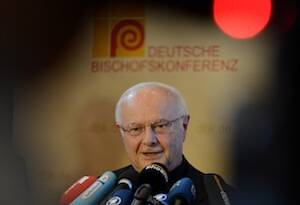The German bishops’ conference defended a decree that said Catholics who stop paying a church membership tax cannot receive sacraments. “There must be consequences for people who distance themselves from the church by a public act,” said Archbishop Robert Zöllitsch of Freiburg, the conference president. “Clearly, someone withdrawing from the church can no longer take advantage of the system like someone who remains a member,” he said on Sept. 24. According to the decree, Catholics who legally separate from the church can no longer receive the sacraments of penance, holy Communion, confirmation or anointing of the sick, except when facing death, or exercise any church function, including belonging to parish councils or acting as godparents. Marriages would be allowed only with a bishop’s consent, and unrepentant Catholics would be denied church funerals.
Introduced in the 19th century, the membership tax, about 8 percent of personal income, brings the German church about $6 billion annually, making it one of the world’s wealthiest.








